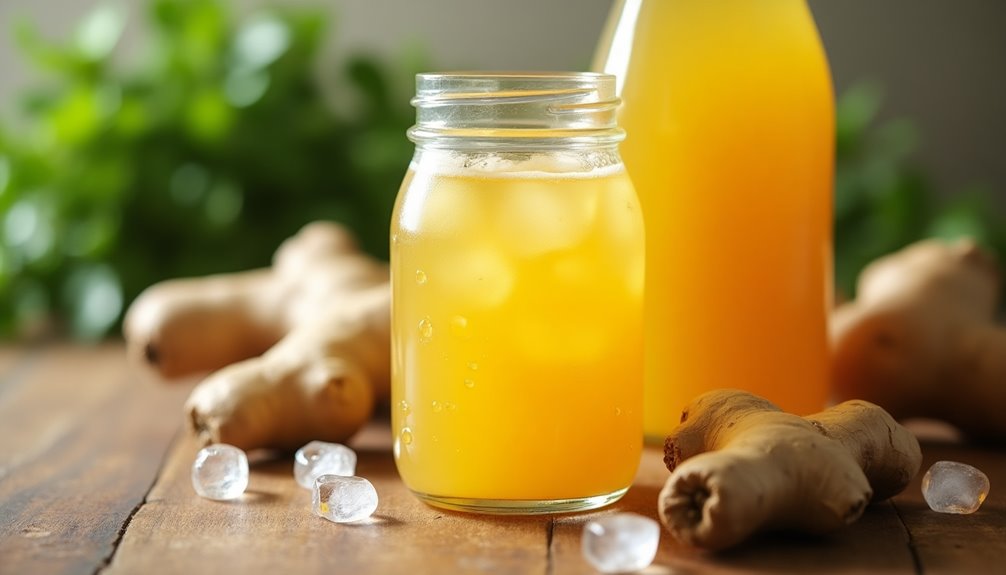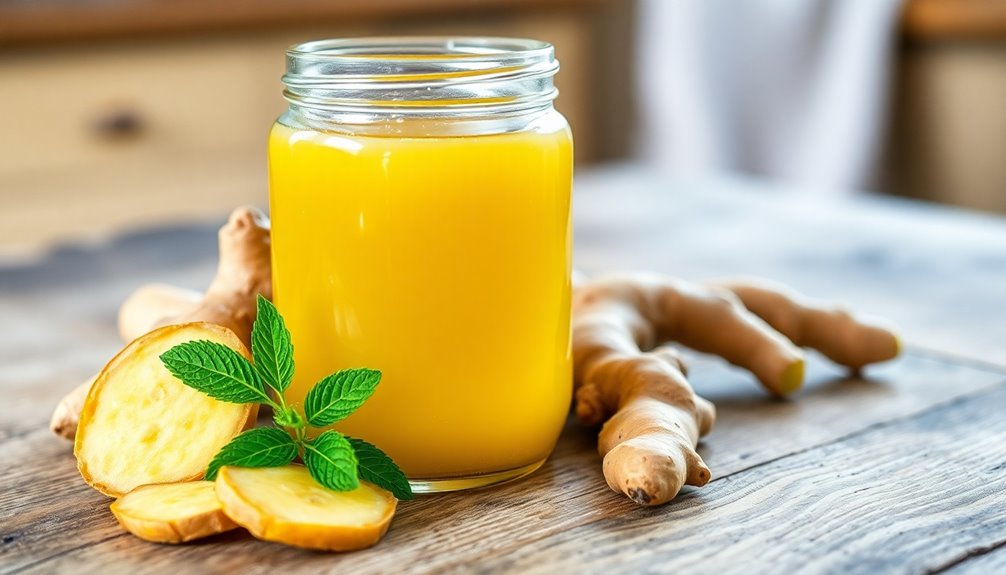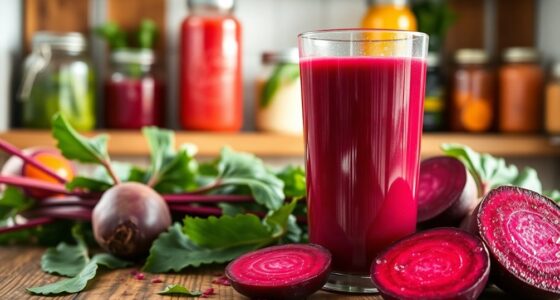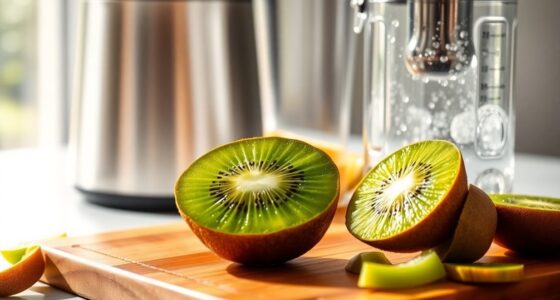Fresh ginger juice typically lasts between 24 to 48 hours when unpasteurized. It's important to store it properly to maintain its freshness and health benefits. Make sure to transfer the juice into an airtight container immediately and refrigerate it to minimize spoilage. If you'd like to keep it longer, consider other storage methods such as pasteurization or freezing, which can significantly extend its shelf life. You'll find out more about those methods next.
Key Takeaways
- Fresh ginger juice lasts 24 to 48 hours when unpasteurized and stored properly.
- To maximize freshness, transfer juice to an airtight container immediately after extraction.
- Refrigeration is essential for maintaining the quality of fresh ginger juice.
- Signs of spoilage include changes in smell or color; discard if these occur.
- For longer storage, consider freezing ginger juice in ice-cube trays.

Have you ever wondered how long fresh ginger juice really lasts? If you've just made a batch of homemade ginger, you're likely curious about how to store ginger juice and keep it fresh. Fresh ginger juice, when unpasteurized, typically lasts only 24 to 48 hours in your refrigerator. This short shelf life is due to its pH level, which sits around 5.9, making it more vulnerable to spoilage. To maintain its freshness, you need to store it properly in an airtight container.
Once you've extracted the juice ginger, it's essential to transfer it into a well-sealed container right away. By doing this, you minimize the exposure to air, which can lead to quicker degradation. If you've gone through the effort of juicing ginger, you want to make sure you get the most out of it, especially considering the health benefits of ginger. Fresh ginger juice is packed with antioxidants and has anti-inflammatory properties, making it a great addition to your diet.
If you're dealing with pasteurized ginger juice, the story changes a bit. Once opened, pasteurized ginger juice can stay fresh for two to three months if you keep it properly refrigerated. However, always check for any signs of spoilage before using it, like changes in smell or color. It's best to stay cautious, as even pasteurized products can spoil under certain conditions.
For those who want to maximize the shelf life of their ginger juice, freezing is a fantastic option. Frozen ginger juice can maintain quality indefinitely when stored in ice-cube trays. This way, you can have an easy-to-use supply ready for whenever you need it. Simply pour your juice into the trays, freeze them, and then transfer the cubes into a larger airtight container for long-term storage. When you need some, just pop out a cube or two and enjoy the numerous health benefits of ginger.
The key takeaway is that fresh ginger juice lasts only a short time, but with proper storage techniques, you can extend its usability significantly. Remember to always use airtight containers, and consume it as soon as possible to reap those health benefits. Whether you decide to enjoy it right away or freeze some for later, knowing how to store ginger juice will help you make the most of your homemade ginger.
Frequently Asked Questions
Does Fresh Ginger Juice Go Bad?
Yes, fresh ginger juice can go bad.
When you store it in the fridge, it typically lasts just 24 to 48 hours. After that, it's prone to spoilage due to its pH level.
You might notice a loss of flavor and potency, especially if it's unpasteurized.
To keep it fresh longer, consider freezing it in airtight containers. This way, you can enjoy its benefits without the worry of it going bad quickly.
How to Tell if Ginger Has Gone Bad?
Isn't it funny how something so vibrant can turn sour?
To tell if ginger's gone bad, trust your senses. If it smells off or sour, it's time to toss it. Look for mold or unusual discoloration—those are clear red flags.
If you see separation, give it a shake, but check for any strange smells or tastes first. Always err on the side of caution; your stomach will thank you later!
How Long Do Juiced Ginger and Lemon Last?
Juiced ginger and lemon can stay fresh in your refrigerator for about 24 to 48 hours if you store them in an airtight container.
The acidity from the lemon helps preserve the juice, but for the best health benefits, you should drink it as soon as possible.
If you pasteurize the juice, it can last two to three months after opening.
Freezing in ice cube trays can extend its shelf life to six months.
How Long Does Liquid Ginger Last?
When you're dealing with liquid ginger, its shelf life can vary.
If it's fresh and unpasteurized, you'll find it stays good in the fridge for about 24 to 48 hours.
However, pasteurized ginger juice can last two to three months once opened.
For long-term storage, consider freezing it in ice cubes.
Just remember, for the best flavor and health benefits, consuming it right after preparation is always your best bet.
Conclusion
In the grand scheme of ginger juice longevity, you might think it lasts forever, but alas, it doesn't! Fresh ginger juice can dazzle your taste buds for about a week in the fridge, but it'll start losing its magic after that. So, don't let it languish like a forgotten relic! Use it, savor it, and let its zing brighten your dishes while it's still fresh. Trust me, your taste buds will thank you for that burst of flavor!
Cindy thoroughly researches juicing trends, techniques, and recipes to provide readers with practical advice and inspiration. Her writing style is accessible, engaging, and designed to make complex concepts easy to understand. Cindy’s dedication to promoting the advantages of juicing shines through her work, empowering readers to make positive changes in their lives through the simple act of juicing.











